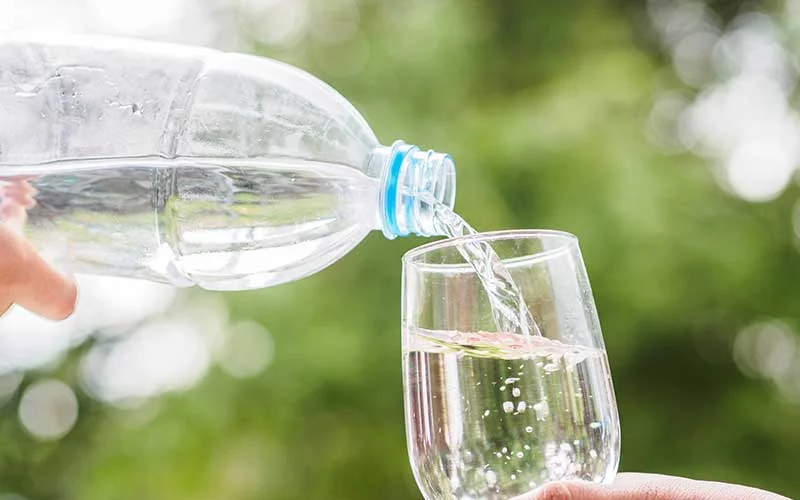Water is an essential component for our bodies to function properly. It’s not just a refreshing drink on a hot day; it’s a fundamental necessity for our health. But have you ever wondered how much water you should drink daily? In this article, we’ll talk about why it’s important to drink enough water, how to figure out how much water you need each day, signs that show you are dehydrated, and ways to keep yourself hydrated.
How Much Water Does Your Body Need in a Day?
The amount of water your body needs can differ from your friends or family members. This is because it’s based on a few things, like your age, whether you’re a boy or a girl, how much you’re on-the-go, and how hot or cold it is outside [1]. Some might tell you you should drink eight glasses of water daily, around 2 liters. But the smart folks who know a lot about this stuff say that what’s right for one person might not be right for another.
How Much Water Is Too Much?
While staying hydrated is important, it’s also likely to overhydrate. Drinking extreme amounts of water fast can lead to water intoxication or hyponatremia, where the balance of electrolytes in your body is disrupted. This is rare and often occurs in extreme situations, like endurance sports.
Maintaining regular hydration isn’t usually a concern for most people, as the body naturally regulates fluid levels. Thirst serves as a reliable indicator of hydration needs. Athletes and those in intense physical activities require more fluids due to increased sweating, whereas electrolyte-rich sports drinks are helpful.
How To Calculate How Much Water To Drink A Day?
A helpful way to estimate how much water you should drink is by considering your weight. A simple method of thumb is to aim to drink about half an ounce to an ounce of water for each pound you weigh. For example, if your weight is 150 pounds, then drinking around 75 to 150 ounces of water daily would be a reasonable goal [2]. It’s important to note that this water intake includes the beverages and water content in foods you eat.
The idea sounds overwhelming, but remember that your body gets water from drinking and the foods you eat. Fruits, veggies, soups, and juicy fruits improve your overall hydration. Adjusting your water intake based on your characteristics and lifestyle will help ensure you give your body the right amount of fluids it needs to function well.
How To Tell If You’re Dehydrated?

Your body can give you hints when it needs more water. Look out for these signs that can tell you it’s time to drink up:
Yellow Pee: When you go to the bathroom, check the color of your pee. If it’s darker yellow, that’s a sign your body needs more water. When you’re well-hydrated, your pee will be a pale yellow or almost clear.
Dry Mouth: If your mouth feels dry and sticky, it signals your body craves water. Drinking water can help moisten your mouth.
Feeling Tired, Dizzy, or Getting Headaches: Not drinking enough water can make you feel tired and slow. You might even feel dizzy or get a headache. These uncomfortable sensations can mean you need more water.
When you’re thirsty, it’s your body’s way of saying it’s running low on water. It’s like a little reminder telling you to have a drink. When you’re thirsty, the best thing to do is grab some water. Please don’t ignore it because your body asks for more liquids.
Remember to drink water regularly during the day to ensure you don’t feel dried out. This is even more important when you’re active, or it’s hot outside. When your body is busy or warm, you lose more water through sweat. So, keep a water bottle nearby and take sips often. Doing this will help you avoid the not-so-fun feelings that come when you don’t have enough water in your body.
Tips to Stay Hydrated Throughout the Day
Carry a reusable water bottle: Having a water bottle with you makes it easier to sip throughout the day.
Set reminders: With busy schedules, forgetting to drink water is easy. Set alarms or use smartphone apps to remind you.
Infuse your water: Add slices of lemon, cucumber, or berries to your water for a flavor that might encourage you to drink more.
Eat water-rich foods: Fruits and veggies like watermelon, oranges, and cucumbers have high water content and can contribute to your hydration.
Drink before meals: Make it a habit to have a glass of water before each meal. This can also help control your appetite.
Create a routine: Link drinking water to specific daily activities right after you wake up or before bed.
Why Is Drinking Water Important To Your Health?

Think of water as a superhero for your body. It does so many important things that help you stay healthy. Your body comprises cells, tissues, and organs; they all need water to work properly. If you don’t drink enough water, you might feel tired, get headaches, or even have bigger health problems. Let’s break it down:
Digestion Helper: Water is like a partner for your gut health. It helps your stomach break down food, so your body can use all its good stuff.
Body Transporter: It’s like a delivery system for important things inside you. Water carries nutrients and oxygen to different body parts, ensuring everything works properly.
Nutrient Extractor: When you eat, your body needs to get all the good parts out of your food. Water helps with that, making sure your body gets what it needs.
Temperature Regulator: Just like Goldilocks’ porridge – not too hot or cold. Water helps keep your body temperature right, especially when playing hard or it’s hot outside.
Toxin Eliminator: Your body can produce waste and stuff it doesn’t need. Water helps flush these yucky things out, like a natural clean-up crew.
Your body comprises tiny building blocks called cells, which need water to work their magic. If you don’t drink enough water, your body might start acting like a sleepy superhero. You could feel tired, get pesky headaches, or even face bigger health troubles. Drinking water is a simple but amazing way to keep your body running smoothly and feeling great.
FAQs
How Do You Drink 2 Liters Of Water A Day?
Drinking 2 liters of water might sound challenging, but it’s doable. Start your day with a glass of water and have another before each meal. Carry a water bottle and take small sips throughout the day. If plain water is boring, infuse it with fruits or herbs for added flavor. Remember, consistency is key.
How Much Water Should A Woman Drink A Day?
The recommended water intake for women is generally around 9 cups (about 2.2 liters) per day. This includes all fluids consumed, not just plain water. However, individual needs vary, so pay attention to your body’s signals and adjust your intake accordingly.
How Much Water Should A Man Drink A Day?
Men usually need more water than women due to their higher muscle mass and metabolic rate. A common guideline is about 13 cups (3 liters) of fluids daily, including water, other beverages, and even moisture-rich foods.
Should I Drink Water During Exercise?
Yes, staying hydrated during exercise is crucial. You lose fluids through sweat, and replenishing those fluids helps maintain your body’s performance and prevent dehydration. Drinking water before, during, and after exercise is recommended, especially if it’s intense or prolonged.
Final Thoughts
Water is an essential element of a healthy lifestyle. Water keeps our bodies running smoothly, promoting overall well-being and functioning. While the “8×8 rule” is a good starting point, individual needs can vary. Pay attention to your body’s signals, make hydrating a habit, and enjoy the benefits of staying hydrated. So, the next time you reach for that glass of water, know that you’re not just quenching your thirst – you’re nourishing your body from the inside out.
Sources
[1] Madelaine. (2022, July 19). Life After Bariatric Surgery: Activities Diet. Washington University School of Medicine in St. Louis Department of Surgery. https://surgery.wustl.edu/life-after-bariatric-surgery-activities-diet/
[2] Kumar, K., Sheikh, Z. (2023, February 1). How Much Water Should You Drink Based on Your Weight? https://www.medicinenet.com/how_much_water_to_drink_based_on_your_weight/article.htm